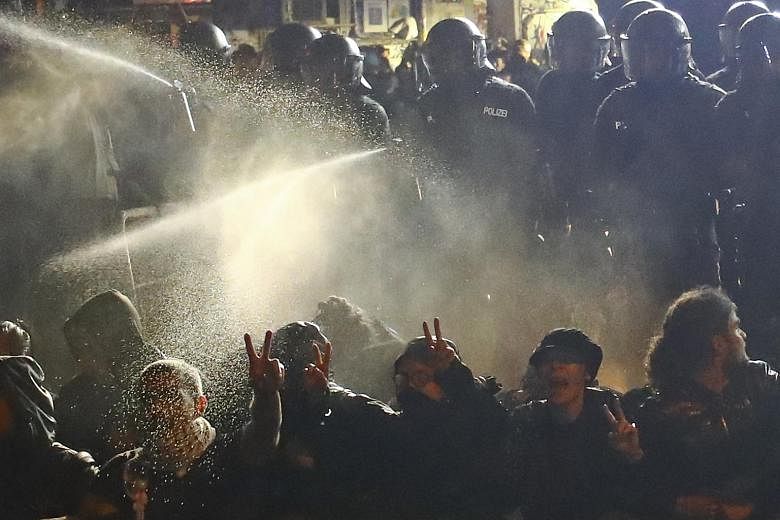BERLIN (Reuters) - Germans expressed anger on Sunday (July 9) over the violence that hit a G-20 world leaders' summit in Hamburg, raising awkward questions for Chancellor Angela Merkel less than three months before an election.
About 20,000 police struggled to contain several hundred anti-capitalist militants who torched cars, looted shops and hurled Molotov cocktails and stones during the July 7-8 summit. Tens of thousands more people demonstrated peacefully.
Overall, 476 officers suffered injuries ranging from cuts and burns from fireworks to eye damage from laser pointers. Police said on Sunday they had arrested 186 people and taken 225 into custody.
German newspapers devoted far more space to pictures of police firing water cannon at hooded anarchists and other protesters than they did to Dr Merkel's diplomatic balancing act with fellow leaders of major world economies.
"Embarrassment for Germany" was Tagesspiegel's description. "The pictures of helpless police who could not secure state order and protection of property are a political catastrophe,"columnist Gerd Nowakowski wrote in the paper.
Top-selling Bild am Sonntag splashed pictures of masked anarchists and politicians on its front page with the headline"Criminals and Losers".
Inside, a political scientist described the scenes as an 'orgy of violence'.
International media have focused more on US President Donald Trump's first meeting with his Russian counterpart Vladimir Putin at the summit, as well as Mr Trump's diverging views on climate change and trade from those of the other leaders.
Nevertheless, an Emnid poll showed that a majority of Germans, 59 per cent, believed the riots damage the image of their country - even though violence has affected a number of international meetings around the world over the years.
Dr Merkel was forced to defend her choice of Hamburg as host city, saying other places, like London, had hosted similar meetings. Hamburg, a seaport, is Germany's second biggest cityy and has a strong radical leftist tradition. It was also home to an Al-Qaeda cell that carried out the 9/11 attacks on US targets in 2001.
Dr Merkel had wanted to demonstrate to G-20 partners, including Mr Putin and Turkish President Tayyip Erdogan, her commitment to freedom of speech, and rejected the notion that some cities were out of bounds as summit venues.
The strategy has backfired, said some commentators.
"I can barely breathe with anger because Chancellor Merkel and Hamburg mayor (Olaf) Scholz trivialise the brutal riots as 'not acceptable'," wrote a commentator in Bild am Sonntag.
The Social Democrats (SPD), trailing Dr Merkel's conservatives by 12-15 percentage points in polls, squarely blamed the Chancellor. "The invitation to the G-20 was issued by the Chancellor. She was the host... That some conservatives are now pushing responsibility onto the SPD and Olaf Scholz is cheap," an SPD deputy, Mr Ralf Stegner, told RND media.
Behind heavy security, Dr Merkel used her negotiating skills to forge a compromise between a range of views. She persuaded leaders to agree on trade, energy and Africa while acknowledging differences with the United States on climate change.
However, she wasn't even involved in what was for many the diplomatic highlight - the first encounter between Mr Trump and Mr Putin.
Seeking to limit the damage from the security problems before the Sept 24 parliamentary election, Dr Merkel has promised compensation to Hamburg residents whose property was damaged.
She can also deflect some of the anger which was directed at Mr Scholz, a Social Democrat, for underestimating the risks. He has been widely castigated for appearing complacent before the summit, saying Hamburg was used to hosting big events and that many residents would barely notice the gathering.
Mr Scholz defend himself, saying: "We did not underestimate the danger. It was not a mistake to hold the summit in Hamburg."

